Exploring the origin and legacy of Ben Reilly and Spider-Man - The Clone Saga with its creators
We look back at the controversial Spider-Man storyline 'The Clone Saga' with the writers and editor who created it
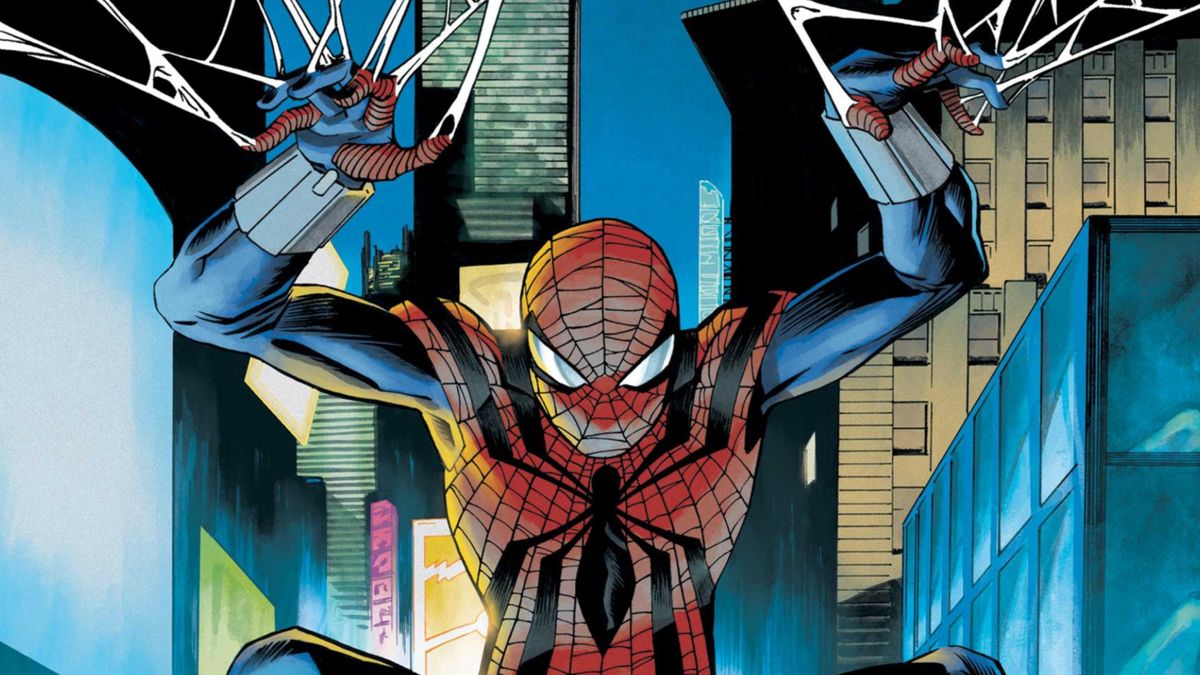
Ben Reilly, the so-called 'Spider-Clone' whose role in Peter Parker's life defined the epic and contentious 'Clone Saga' storyline of the '90s, has undergone a new transformation after his latest stint filling in as Spider-Man, and this week teams up with another Marvel Clone - Madelyne Pryor, aka the Goblin Queen, for the Spider-Man/X-Men crossover event Dark Web, starting on December 7.
In Amazing Spider-Man #93 earlier this year, Ben took on the new super-villainous identity of Chasm, with some apparent new powers, and new status quo as one of Spider-Man's strangest and most tragic arch-foes.
Ben Reilly's journey from a forgotten small detail in a decades-old story, to a two-time Spider-Man, to now supervillain has been a long, winding, and as we say, often controversial and contentious one.
A few years back Newsarama spoke in detail with some of the architects of the original Ben Reilly 'Clone Saga,' in which we discussed the origins of the storyline and the development of Ben as a character. We revisit the interview below.
Original story published December 24, 2019
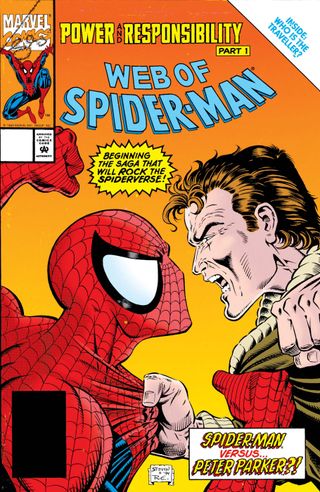
Before 'One More Day,' before Superior Spider-Man – there was the 'Clone Saga', and this October marked the 25th anniversary of the comic book epic. The story arc spanned for a whopping three years, first launching in 1994 and then ending in December 1996. The Marvel Comics marketing department of that era saw the rise in sales and wanted to further bank on the event's success, which is why as you'll read it turned from a story into a "saga."
The now-infamous storyline introduced Ben Reilly who was revealed to be the real Peter Parker and that Peter Parker was a clone – which angered fans and led to the arc's controversial legacy.
Even though the story polarized many fans, like almost all things, the passing of time has blunted the original edges and the 'Clone Saga' now enjoys something of nostalgic classic status.
Comic deals, prizes and latest news
Get the best comic news, insights, opinions, analysis and more!
Newsarama had the chance to talk to some of the creative minds behind the 'Clone Saga, including executive editor Tom DeFalco, and writers Terry Kavanagh and Howard Mackie.
Kavanagh originally pitched the story to Marvel and Mackie worked on many of the smaller crossovers involved with the story arc. We discuss the series' overall impact on Spider-Man as a character and Marvel as a company, their impressions of Marvel's subsequent follow-ups, and how they feel people would react to the story today.
Newsarama: Gentlemen, looking back 25 years later, how do you feel the 'Clone Saga' affected not only the Spider-Man franchise but the comic medium as a whole?
Terry Kavanagh: Tough question to start with. But also, much easier to answer with 25 years of perspective and response.
It definitely affected the Spider-franchise. Sales-wise, it was a huge success at the time, but a critical not-so-success. Historically, it appears to be a winner due to the many, many fans that grew up with Ben Reilly, and the return to the storyline in comics and other mediums.
Howard Mackie: I am amused by it all. Our 'Clone' story arc – it did not start out as a "saga" – certainly created its share of controversy at the time. It was loved by many and pilloried in the fan press of the time. The creators were simply trying to tell a story that would allow the adventures of Spider-Man and the life of Peter Parker to go in a different direction. A direction that would allow it to go forward unencumbered by a few decades of continuity.
Stepping back from the controversial elements of the time I think we succeeded.
Tom DeFalco: I think the 'Clone Saga' was an exciting story that inflamed the passions of our readers which is the goal of every story. I am pleased to see that it added a few new elements to the Spider-Man franchise, but I'm not convinced it had any long-term effects on the comics medium.
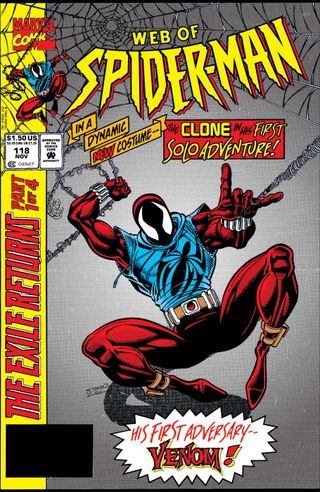
Nrama: Why do you think it's such a memorable story?
Kavanagh: The original Gerry Conway intro of the clone was memorable to me because it was two-good-guys-in-a-bad-situation. A clone of Peter Parker, until experience shapes him otherwise, is by definition a good guy. That was fascinating and interesting to me, personally. If we did it correctly. That's why it worked for our Ben Reilly readers as well.
Mackie: Did I mention controversy? It was intended to be a big, controversial story that upset the apple cart of Spider-Man continuity.
Again, I think the story – as originally conceived of by the creators – would have done that and given a new breath of fresh air to the life and adventures of Peter and Spider-Man. Unfortunately, it became a victim of its own success.
We had been charged with creating a Spider-Man story that would lift sales and it did exactly that as the comic book industry suffered a severe downturn. The 'marketing genius' of the time decided that the storyline should not end. 'Marketing genius' have no idea what constitutes a story. Beginning. Middle. End. They decided we should focus on the middle. As a result, a storyline that was conceived to be three months long went on for more than two years and became a "saga."
DeFalco: I think it is so memorable because it is all about personal identity. Every reader can identify with Peter Parker in this story. Am I who I really believe I am? Or am I only kidding myself? It gets to the core of how we see ourselves and how others see us.
Nrama: Terry, how did the idea for the 'Clone Saga' come about?
Kavanagh: See above. And then add the fact that I, at least – and I suspect the other creators – felt hamstrung by the fact that Peter was married to the acknowledged most beautiful woman/model in town, and had to worry about his mortgage on their spectacular apartment, etc.
As the creators matured, we (I think) mistakenly matured Peter. Suddenly, he had our problems – marriage, mortgage, etc. – instead of his problems. Tough for younger readers to identify with. That's my opinion, at least.
I really, really wanted to come out the other side of it somehow (without adding more baggage by killing MJ and making Peter a widower.)
And, seriously, Dolly the cloned sheep on the cover of Time Magazine made the whole thing okay.
Nrama: How did your colleagues react to the story?
Kavanagh: Hmmm... great question. Howard Mackie and I talked all the time, and he was on board from the minute I first mentioned it to him. The other creators at the conference were initially resistant, citing – understandably – the just-completed Spider-storyline where Peter's parents returned (before being revealed as LMDs, I believe).
The minute we revealed the intention that Ben Reilly would turn out to be the true Spider-Man – unmarried, without a college degree – most everyone in the room was on board. Writers, artists, assistant editors – with one singular exception – the editor. We finally sold him on it, although he still had reservations.
He brought the editor-in-chief to the conference the next day. The E-i-C was also initially resistant, citing the 'Bobby-in-the-shower' scene on the TV show, Dallas, that told the viewers everything they had seen in the previous scene was just a dream. Nobody liked that. But, once we pointed out to him that that wouldn't be the case here – everything that had happened over the previous years was real history to our characters – he was onboard, too.
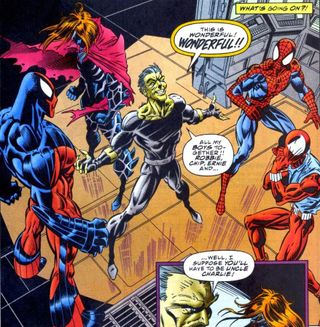
Nrama: What was the decision behind making such a big change to Spider-Man's character?
DeFalco: I remember when the Spider-Man writers and artists pitched the story to me. They were all so passionate and committed to it. I figured the readers would be too. Seems I was right.
Nrama: Do you think you could have played out this story for as long as you did in today's comic book landscape? How do you think people would have reacted in the age of social media?
Kavanagh: From the beginning, we all agreed that it would be four months over five titles. The sales and marketing team came to editorial and made it clear that the super-increase in sales meant that we couldn't end it as soon as we'd planned. Things snowballed from there.
I did not continue on Web of Spider-Man through the whole storyline. I thought it was too long then, and I think it would be too long now.
No idea what the reaction would have been on social media.
Mackie: Does anything play out that long in today's market? Now that you mention it… the creators would probably have been allowed to tell the storyline they wanted to do. Today's comic book landscape would have forced us to keep it tight. Now I am sad.
DeFalco: Probably not. I think the story was stretched a little too far. The sales department was calling the shots in those days and they wanted the story to keep on going because it was selling so well – both on the mass-market newsstand and in the comic books stores.
I think the entire sales landscape has changed so much. Marvel no longer has a strong mass-market newsstand business and the comic book stores are very unforgiving. If the store owner doesn't like a certain title or storyline, he won't order it and his customers will never even get a chance to buy it.
I think the 'Clone Saga' would have sparked even more controversy now than it did in the past. People would be writing posts – pro and con – long before they even bothered to read the actual comics. It would have been very interesting to read all those posts before the story was even printed.
Nrama: Tom and Howard, you both worked on Spider-Man: The Real Clone Saga. What made you want to return to the story?
Mackie: I found the notebook with the original notes from our first Clone story meeting. I showed them around the Marvel offices, spoke to Ralph Macchio and Tom DeFalco… suddenly we were writing it.
I do believe that the memories of the original writers are all over the place. It's the Rashomon Effect… if you asked any one, two, or three of the original writers to tell you what was supposed to happen in the 'Clone Story' you would have an ongoing 'Clone Saga' series.
DeFalco: Howard Mackie wanted to do it and I owed him money.
Nrama: How did you feel about Ben Reilly's return in 2017? Did you get to read the story?
Kavanagh: I read and I really enjoyed it. Like I do all of Dan Slott's work. I think he figured out a very approach to the return of Ben Reilly, and a story arc that took a fresh look at the original 'Clone Saga.'
Mackie: I have a policy of never reading the adventures of a comic book character after I am done writing them. I don't ever want to inadvertently seem to criticize the writing of those who come after me.
Having said that, Terry Kavanagh kept trying to get me to read it because he thought Dan Slott did a great job. I think Dan is an awesome writer, and I'm sure Terry is correct, but I stick to my policy.
Nrama: Tom, in your Spider-Girl series you had many homages to Ben Reilly and the Clone Saga from May's costume to May having her own clone. What made you want to add these storylines to your run?
DeFalco: Mayday came out of the 'Clone Saga' and I felt it only fitting to keep that as part of her backstory and regular storylines.
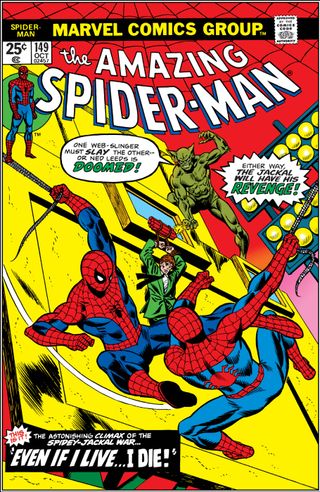
Nrama: How do you feel about Marvel rehashing the Clone Saga for other storylines?
Kavanagh: Go for it. Have as much fun with it as I had with returning to the original, original Clone story. And make it as relevant.
Mackie: Again have not read them, but it's to be expected.
DeFalco: That's the biz! I'm afraid I haven't read any of the other storylines so I don't have an opinion of them.
Nrama: How was your collaboration with the other Spidey writers for the event?
Kavanagh: See above. I had tremendous fun working with all the creators at the time. And everyone added to the story in their own unique ways.
Mackie: I count all those involved as friends – then and now. We had a ton of fun... when we weren't crying.
Nrama: Do you have a favorite issue of the Clone Saga?
Kavanagh: Can't answer that.
Mackie: Easier for me to remember my least favorite issues – which I will not reveal.
DeFalco: I had to reread the entire saga a few years ago when Howard Mackie and I did that Real Clone Saga limited series. I guess enough time had passed that I was actually surprised at how good some of those stories were. I don't really have a favorite, but Howard, Marc DeMatteis, Todd DeZago, and Terry Kavanagh all did some very good work.
Nrama: Would you like to see the arc adapted for the Marvel Cinematic Universe or Into the Spider-Verse films?
Kavanagh: Of course. That would be so cool.
Mackie: Hell yeah!
DeFalco: Spider-Man has had so many great storylines over the years. I don't think the MCU or the Spider-Verse needs the 'Clone Saga.'
Do you think the 'Clone Saga' is one of the best Spider-Man stories of all time? Compare your list to Newsarama's best Spider-Man stories of all time.
Kat has been working in the comic book industry as a critic for over a decade with her YouTube channel, Comic Uno. She’s been writing for Newsarama since 2017 and also currently writes for DC Comics’ DC Universe - bylines include IGN, Fandom, and TV Guide. She writes her own comics with her titles Like Father, Like Daughter and They Call Her…The Dancer. Calamia has a Bachelor’s degree in Communications and minor in Journalism through Marymount Manhattan and a MFA in Writing and Producing Television from LIU Brooklyn.
Most Popular


